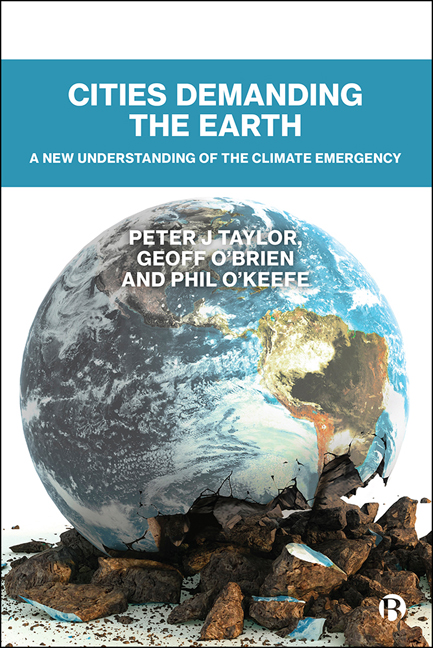Book contents
- Frontmatter
- Dedication
- Contents
- List of Tables and Figures
- About the Authors
- Preface
- 1 Declarations: Root and Branch Unthinking
- 2 Alternate: Jane Jacobs’ legacy
- 3 Inside Out: Fourteen Antitheses Authenticating Cities
- 4 Reset: Anthropogenic Climate Change is Urban, not Modern
- 5 Action: Can We Stop Terminal Consumption?
- References
- Appendix: Primer on Climate Change Policy
- Index
4 - Reset: Anthropogenic Climate Change is Urban, not Modern
Published online by Cambridge University Press: 19 March 2021
- Frontmatter
- Dedication
- Contents
- List of Tables and Figures
- About the Authors
- Preface
- 1 Declarations: Root and Branch Unthinking
- 2 Alternate: Jane Jacobs’ legacy
- 3 Inside Out: Fourteen Antitheses Authenticating Cities
- 4 Reset: Anthropogenic Climate Change is Urban, not Modern
- 5 Action: Can We Stop Terminal Consumption?
- References
- Appendix: Primer on Climate Change Policy
- Index
Summary
Introduction: trans-modern scholarship
The last chapter made the case for unthinking in a trans-modern manner; here we implement this approach. But developing transmodern scholarship is fraught with knowledge difficulties. In effect, our take on anthropogenic climate change is a provocation to modernity's innate superiority complex. We are downgrading our modern world from ultimate historical climax to just another historical interlude. This changing macro-positionality means we are basically searching for a sort of ‘self-reflexivity’ at a societal level, moving towards a global ecological holism that Jacobs understood many years ago:
The fragile ecology of a city and the fragile ecology of the Arctic stand or fall together. Because a mounting problem has gone unsolved in cities, in deference to the status quo, the outermost wilderness is finally threatened. (From a speech by Jane Jacobs in 1970, quoted in Zipp and Storring, 2016a: 203)
We tackle this transcending of modern sensibilities, as indicated by our title, by transferring the ‘anthropo’ in contemporary climate change from industrialisation, as specifically modern, to urbanisation, as generic focus: modern people are not the only humans to influence planetary climate change. The chapter consists of two arguments, the first developing and presenting a narrative for anthropogenic climate change, and the second making trans-modern interventions through consequent new chorological and chronological framings.
As described in the last chapter, at the heart of the modern mindset there is grand narrative combining a progress (development) chronology with a mosaic (states) chorography. This can be challenged in two ways, by eschewing grand narrative as legitimate reasoning or by constructing a contrary narrative. In practical terms we think the former is the risky option for radical social change at the macro level because it leaves a pedagogic vacuum. Thus we confront the modern narrative with an alternative narrative customised for humans’ role in planetary climate change. This combines a generic process – urban demand – with historical specifics in a story that importantly includes, but does not extoll, modernity.
The second part is equally contentious. In the chorological intervention we identify research themes for a relevant urban studies. There is a long tradition of critical urban scholarship that we do not engage with in this book.
- Type
- Chapter
- Information
- Cities Demanding the EarthA New Understanding of the Climate Emergency, pp. 71 - 94Publisher: Bristol University PressPrint publication year: 2020



